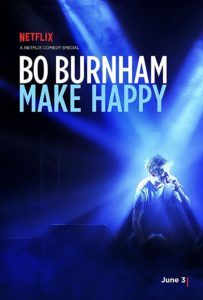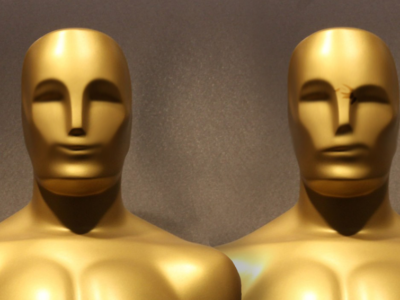Make Happy: Bo Burnham Gets Real
The world is not funny. We are all dying.
 Thus opens Make Happy, Bo Burnham’s comedy special from 2016. Though it is four years old, and the world seems to have massively changed since then, some things stay the same. There are still people starving. There are still people dying. The world still sucks, maybe now more than ever. So why dredge up a comedy special that opens by telling us about just how bad the world is?
Thus opens Make Happy, Bo Burnham’s comedy special from 2016. Though it is four years old, and the world seems to have massively changed since then, some things stay the same. There are still people starving. There are still people dying. The world still sucks, maybe now more than ever. So why dredge up a comedy special that opens by telling us about just how bad the world is?
Because it’s absolutely hilarious.
Burnham’s shtick, if you’ve never run into him before, is impersonating an arrogant jerk who sometimes breaks character to show his insecure, true self while also performing absurd bits and ridiculous songs. For example, he has a bit where he mimes what it feels like to make a peanut butter and jelly sandwich while high on marijuana (dramatic, tense, and deathly important), and then he mimes what it feels like to make the same sandwich while drunk (slow, dimwitted, and apathetic). The bit then devolves into “drunk” Burnham’s wife/girlfriend returning home and critiquing him for making a mess of the imaginary kitchen while making the imaginary sandwich, all of which is still inside of the sketch and with no performers other than Burnham and his pre-recorded voice over the speaker system. Sound absurd? Welcome to Make Happy. (Is it any surprise to know he started out on YouTube?)
If you can’t tell by now, I’m a fan of Burnham. His absurdity, angst, and music hit me at the right time of life, and they are exactly my type of comedy. Burnham’s not for everyone, but I think the heart of his special is fascinating, especially during such a dark time as this.
 In the midst of all of his pomposity and absurdity, Burnham is wrestling after happiness and decrying false sources of happiness. One of Burnham’s songs skewers pop music that claims music can solve depression and sorrow (Burnham explicitly calls out Katy Perry’s “Roar” as an example). To depend on songs to bring happiness is akin to thinking songs can cause depression, which is why Burnham’s satirical response song is titled “Kill Yourself.”
In the midst of all of his pomposity and absurdity, Burnham is wrestling after happiness and decrying false sources of happiness. One of Burnham’s songs skewers pop music that claims music can solve depression and sorrow (Burnham explicitly calls out Katy Perry’s “Roar” as an example). To depend on songs to bring happiness is akin to thinking songs can cause depression, which is why Burnham’s satirical response song is titled “Kill Yourself.”
Burnham equally satirizes country artists who try to play themselves off as rural Americans by referencing beer and trucks, when the singers live in mansions and do not work manual jobs. Their songs, far from showing a sense of compatriotism between celebrities and rural America, actually work as insulting pandering. Burnham goes on to ridicule celebrity lip syncing, arguing that we deserve more out of our entertainment than “people we’ve seen too much of pretending to sing along to songs we’ve heard too much of.” Burnham even takes a stab at consumption as a source of happiness by inserting a fake ad for Flaming Hot Cheetos and saying that he’s not being paid but trying to get them to sponsor him.
In these moments and others, Burnham turns the satirical gunsight off others (celebrities and music stars) and turns them on himself. He is equally a performer. What right does he have to his audience’s time? What social benefit is he bringing about? As he said in the opener, people are dying every day and he’s on a stage trying to make people laugh and searching for his own happiness in making them laugh. Yet, the more he searches, the more he realizes that if he’s constantly looking for happiness in others, he’ll never find it. Looking for happiness in others is as foolish as looking for it in a pop song.
 The most fascinating turn in the special is when Burnham calls everyone a performer. Social media has us all performing for the “likes” and admiration of our friends, family, and acquaintances. Like Burnham, most of us probably will never find the fame or validation that we want, or if we do it’ll be tragically fleeting. Here arises Burnham’s main point: happiness is never found externally. Happiness is not found: it is made. This is a poignant point at a time when it seems like the world is falling apart and I, among others I’d assume, am looking for some source of happiness to get me through. Burnham says looking for happiness in celebrities or music is as silly as looking for it in a peanut butter and jelly sandwich.
The most fascinating turn in the special is when Burnham calls everyone a performer. Social media has us all performing for the “likes” and admiration of our friends, family, and acquaintances. Like Burnham, most of us probably will never find the fame or validation that we want, or if we do it’ll be tragically fleeting. Here arises Burnham’s main point: happiness is never found externally. Happiness is not found: it is made. This is a poignant point at a time when it seems like the world is falling apart and I, among others I’d assume, am looking for some source of happiness to get me through. Burnham says looking for happiness in celebrities or music is as silly as looking for it in a peanut butter and jelly sandwich.
How do we make happy? Burnham argues happiness is made through authenticity: “If you can live your life without performing, do it.” As a Christian, I find this point incredibly fascinating but ultimately a little naïve. Authenticity to what? To my wants and my wishes? This may alleviate my lack of validation, but my wants and wishes can be awful. Many times I don’t want to do the dishes or love my family or do my work. Is adhering to myself, my own wants, the best thing for making me happy? Maybe. But what about the rest of the world? Instead of simply arguing authenticity to self, I take a more Christian route (obviously) and instead talk about true humanity, to the human Christ wants me to be. It’s by no means as easy as authenticity to myself, but maybe, just maybe, it’s what will truly make (me) happy.
 To my mind, authenticity is insufficient in itself for anything other than selfish happiness. This is not to say Burnham is wrong about authenticity and we should instead pretend to be something we are not. Instead, we should be authentic about our brokenness and failures while striving for something better. Too often I pretend to be a better Christian than I really am. I perform. But this performance, even within the church, is not a path to happiness. As a human being, I cannot bear the weight of having to be perfect all the time, of having to perform perfection. Instead, I should admit the true extent of my brokenness and marvel that I am forgiven. When I expose who I truly am and reveal my failures to Christ and fellow Christians, I give them the space to help me change and invite them into the freedom of authenticity.
To my mind, authenticity is insufficient in itself for anything other than selfish happiness. This is not to say Burnham is wrong about authenticity and we should instead pretend to be something we are not. Instead, we should be authentic about our brokenness and failures while striving for something better. Too often I pretend to be a better Christian than I really am. I perform. But this performance, even within the church, is not a path to happiness. As a human being, I cannot bear the weight of having to be perfect all the time, of having to perform perfection. Instead, I should admit the true extent of my brokenness and marvel that I am forgiven. When I expose who I truly am and reveal my failures to Christ and fellow Christians, I give them the space to help me change and invite them into the freedom of authenticity.







